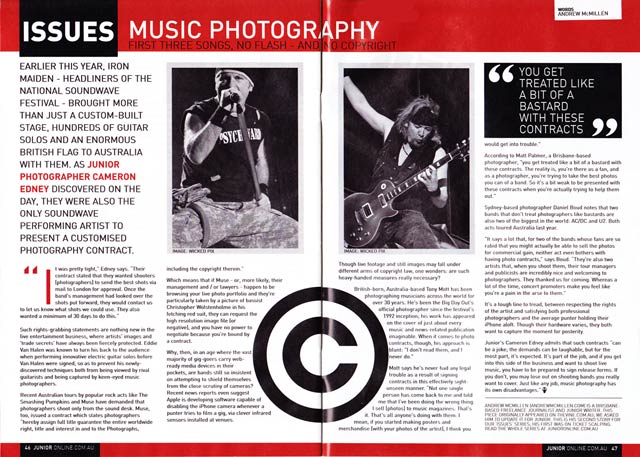Junior ‘issues’ story: ‘Music Photography: First Three Songs, No Flash – And No Copyright’, July 2011
A feature story for the ‘issues’ section of monthly street press Junior, July 2011. It’s an updated version of a feature that originally appeared on TheVine.com.au.
Click the below image for a closer look, or read the article text underneath.
Music photography: First three songs, no flash – and no copyright
Earlier this year, Iron Maiden – the most recent headliners of the national Soundwave Festival – brought more than just a custom-built stage, hundreds of guitar solos and an enormous British flag. As Junior photographer Cameron Edney discovered on the day, they were also the only Soundwave performing artist to present a customised photography contract.
“It was pretty tight,” Edney says. “Their contract stated that they wanted shooters [photographers] to send the best shots via mail to London for approval. Once the band’s management had looked over the shots put forward, they would contact us to let us know what shots we could use. They also wanted a minimum of 30 days to do this.”
Such rights-grabbing statements are nothing new in the live entertainment business, where artists’ images and ‘trade secrets’ have always been fiercely protected. Eddie Van Halen was known to turn his back to the audience when performing innovative electric guitar solos before Van Halen were signed, so as to prevent both his newly-discovered techniques from being viewed by rival guitarists – as well as being captured by keen-eyed music photographers.
Recent Australian tours by popular rock acts like The Smashing Pumpkins and Muse have demanded that photographers shoot only from the sound desk. Muse, too, issued a contract which states that photographers “hereby assign full title guarantee the entire worldwide right, title and interest in and to the Photographs, including the copyright therein”.
Which means that if Muse – or, more likely, their management and/or lawyers – happen to be browsing your live photo portfolio and they’re particularly taken by a picture of bassist Christopher Wolstenholme in his fetching red suit, they can request the high resolution image file (or negative), and you have no power to negotiate because you’re bound by a contract.
Why, then, in an age where the vast majority of gig-goers carry web-ready media devices in their pockets, are bands still so insistent on attempting to shield themselves from the close scrutiny of cameras? Recent news reports even suggest that Apple is developing software capable of disabling the iPhone camera whenever a punter tries to film a gig, via clever infrared sensors installed at venues. Though live footage and still images may fall under different arms of copyright law, one wonders: are such heavy-handed measures really necessary?
British-born, Australia-based Tony Mott has been photographing musicians across the world for over 30 years. He’s been the Big Day Out’s official photographer since the festival’s 1992 inception; his work has appeared on the cover of just about every music and news-related publication imaginable. When it comes to photo contracts, though, his approach is blunt: “I don’t read them, and I never do.”
Mott says he’s never had any legal trouble as a result of signing contracts in this effectively sight-unseen manner. “Not one single person has come back to me and told me that I’ve been doing the wrong thing. I sell [photos] to music magazines. That’s it. That’s all anyone’s doing with them. I mean, if you started making posters and merchandise [with your photos of the artist], I think you would get into trouble.”
According to Matt Palmer, a Brisbane-based photographer, “You get treated like a bit of a bastard with these contracts. The reality is, you’re there as a fan, and as a photographer, you’re trying to take the best photos you can of a band. So it’s a bit weak to be presented with these contracts when you’re actually trying to help them out.”
Sydney-based photographer Daniel Boud notes that two bands that don’t treat photographers like bastards, however, are also two of the biggest in the world: AC/DC and U2. Both acts toured Australia last year.
“It says a lot that, for two of the bands whose fans are so rabid that you might actually be able to sell the photos for commercial gain, neither act even bothers with having photos contracts,” says Boud. “They’re also two artists that, when you shoot them, their tour managers and publicists are incredibly nice and welcoming to photographers. They thanked us for coming. Whereas a lot of the time, concert promoters make you feel like you’re a pain in the arse to them.”
It’s a tough line to tread, between respecting the rights of the artist and satisfying both professional photographers and the average punter holding their iPhone aloft. Though their hardware varies, they both want to capture the moment for posterity.
Junior’s Cameron Edney admits that such contracts “can be a joke; the demands can be laughable, but for the most part, it’s expected. It’s part of the job, and if you get into this side of the business and want to shoot live music, you have to be prepared to sign release forms. If you don’t, you may lose out on shooting bands you really want to cover. Just like any job, music photography has its own disadvantages.”
Andrew McMillen (andrewmcmillen.com/) is a Brisbane-based freelance journalist and Junior writer. This piece originally appeared on TheVine.com.au; we asked him to update it for Junior. This is his second story for our ‘issues’ series; his first was on ticket scalping. Read the whole series at junioronline.com.au

 First Three Songs, No Flash – And No Copyright
First Three Songs, No Flash – And No Copyright